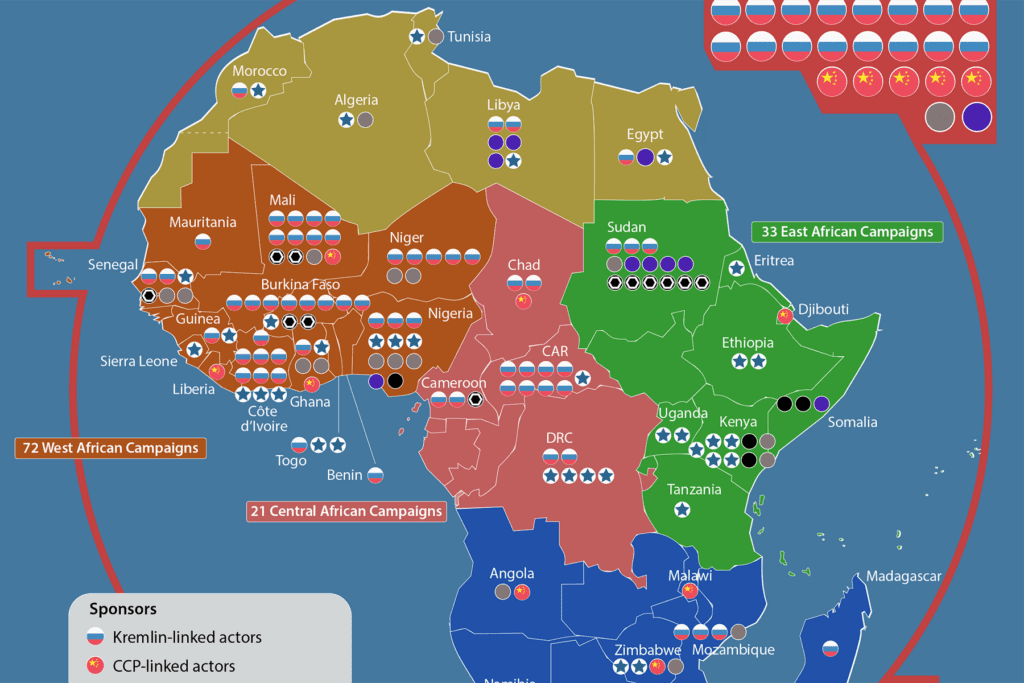Actors driving sophisticated disinformation attacks on African media ecosystems are taking advantage of the rapid expansion in the reach and accessibility of digital communications to reshape the continent’s information systems at scales and speeds not possible through traditional analog platforms.
This onslaught of purposeful obfuscation comes as 300 million Africans have come onto social media in the past 7 years. There are now more than 400 million active social media users and 600 million internet users on the continent. Africans who are online rely on social media platforms for consuming news at among the highest rates in the world. Social media users in Nigeria and Kenya are near the top of the globe in the number of hours per day spent on social platforms. They are simultaneously the countries that report the most concern about false and misleading information.
Russian Disinformation around Niger’s Coup
Building on a template employed in Mali and Burkina Faso, Wagner-linked campaigns surrounding the coup in Niger showcase an increasingly well-calibrated Russian disinformation playbook in West Africa that is both calculated and opportunistic. The campaigns targeting Niger have utilized online networks, assets groomed on-the-ground like UNPP (Union des Patriotes Panafricanistes) and GPCI (Groupe Panafricain pour le Commerce et l’Investissement), and Russian state media to launch a barrage of fake content before, during, and after the July 2023 coup in Niger.
Pre-coup: following the October 2022 coup in Burkina Faso, pro-Russian Telegram channels suggested Niger as a future target. Disinformation networks connected to the Wagner Group twice sought to spark rumors of a coup in Niger, including through what appears to have been a carefully orchestrated online scheme coinciding with a trip abroad by President Bazoum in February 2023.
Immediate aftermath: as the coup was unfolding in late July, the leader of the Wagner Group, Yevgeny Prigozhin, welcomed the events, posting a message of support on Telegram from St. Petersburg where he was attending the Russia-Africa Summit. Wagner-linked networks echoed Prigozhin in cheering the coup, encouraging the violent suppression of pro-democracy demonstrators in Niamey, and exploiting the confusion to frame the events as anti-France and as representing a momentous surge in African support for a Russian vision of the global order. Fact-checkers reported having difficulty keeping up with the volume of fake claims. The effect was to confuse and paralyze citizens from responding. As one observer described, “I’ve had to distance myself from everything because I don’t know what’s true and what’s not. … Everything seems to be a lie or exaggerated.”
Post-coup: Wagner assets sought to consolidate the coup in Niger by derailing negotiations between its leaders and regional mediators. Networks spanning closed channels (Telegram, WhatsApp), social media sites (X/Twitter, Facebook), and traditional media (Afrique Média) spread content intended to inflame Nigerien mistrust of these processes, including claims that an ECOWAS invasion was imminent and that French fighter jets were landing in Senegal to support ECOWAS. Russian campaigns moved to exploit the coup by spreading false narratives promoting Wagner mercenaries as an answer to Niger’s security challenges. Content related to Niger spiked by 6,645 percent on 45 Russian state and Wagner Telegram channels in the month after the coup, as these accounts ramped up disinformation to cement the military junta and associate it with Russia.
Source link : https://africacenter.org/spotlight/mapping-a-surge-of-disinformation-in-africa/
Author :
Publish date : 2024-03-13 07:00:00
Copyright for syndicated content belongs to the linked Source.
